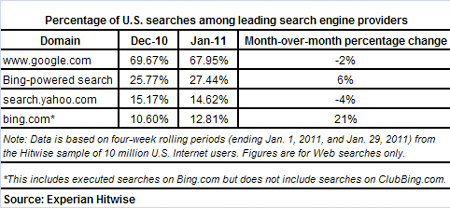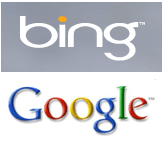| Bing more accurate than Google |
| Friday, 11 February 2011 | |||
|
Last week Microsoft and Google were conducting a war of words over their respective search engines, this week it has become statistical with the latest figures suggesting that Bing is more accurate than Google. The competition between Google and Bing, Microsoft's search engine, turned into animosity last week when Google accused Microsoft of copying its search results. Microsoft was "caught" red handed by a "sting" operation that Google had arranged - set up a nonsense search target and return some unrelated web pages; wait a while and then check to see if Bing produced the same irrelevant result. Bing did. Microsoft's response was that it had been "monitoring" Google search results for years. After all both search engines track what users do to improve search quality. It is a strategy that appears to have paid off for Bing in that the latest results from market researcher Experian Hitwise suggest that Bing is delivering more accurate results. 81% of search queries at Bing are successful compared to 65% of Google searches. In other words, 35% of search queries at Google deliver results that are so irrelevant that users don't bother to click a single one of them.
Commentators suggest that part of the problem may lie with the computer users specifying the query - naive users who don't how to build a good search query are more likely to use the well-known Google rather than the less popular Bing. For the same reason Google may also get a larger share of the really obscure queries for which there are no easy anwsers.
(Click table to view) The Experian study also shows that Google is losing users while Bing is gaining them. In the U.S. Bing now powers more than 27% of search results, up from 26% in December, and that's despite a slight decline in traffic to Yahoo's search site, which has been powered by Bing since December. In other words, the growth at Bing is coming from Microsoft's own search site. In the same period Google's share dropped a little more than a point, from 70% to just under 68%.
|
|||
| Last Updated ( Saturday, 12 February 2011 ) |



